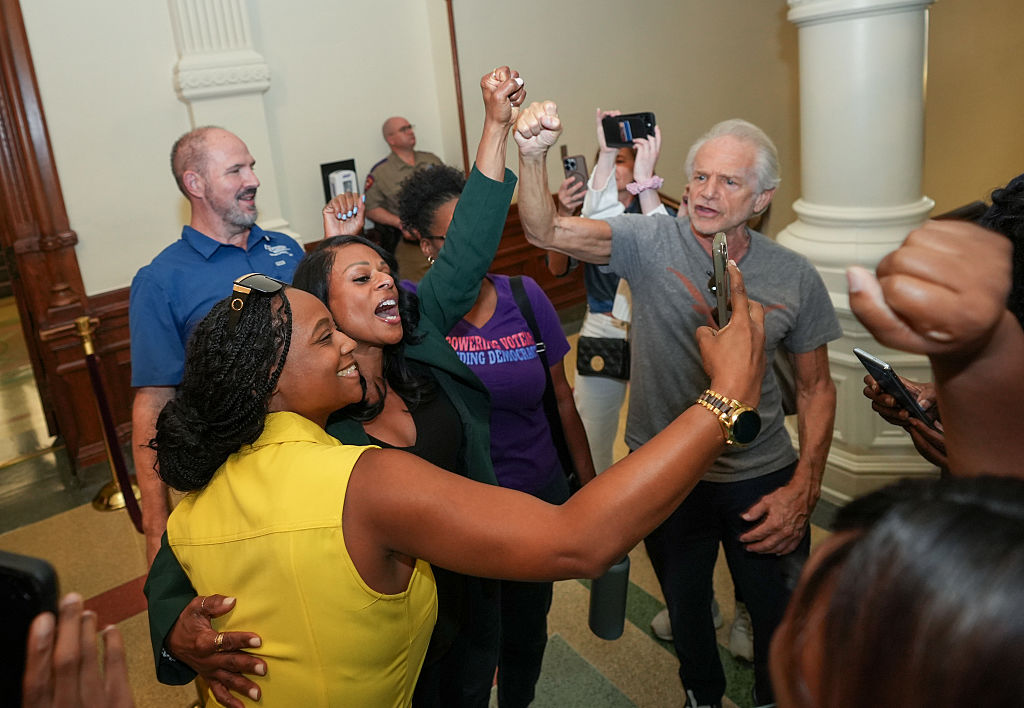Harriet Jacobs, Rep. Nicole Collier, And Black Women Who Don’t Bow

In 1835, Harriet Jacobs wedged her 22-year-old body into a crawl space above her grandmother’s house in Edenton, North Carolina, for seven years. Enslaved and hunted by a white man determined to control her body, she chose confinement rather than submission.
In her 1861 book Incidents in the Life of a Slave Girl, Jacobs described the garret as so cramped she couldn’t stand, could barely sit, and was only able to peer out at her children through a tiny peephole. Her skin was chewed by insects, her muscles stiff with immobility, and her spirit refusing to bend.
She called it her “loophole of retreat.” But it was also an act of rebellion: seven long years of resistance carved out of three feet of air. Better to suffer in hiding than to surrender to her oppressor.
More than a century and a half later, Texas Rep. Nicole Collier wrapped herself in a blanket, tied down her bonnet, pulled a sleep mask low, and stretched out at her desk for two nights on the House floor. She refused to sign the Republicans’ “permission slip” that would place her under constant police escort.
Like Jacobs, Collier chose confinement on her own terms rather than submit to a system meant to humiliate her. Different century, different tools, same logic: Black women boxed in whenever they refuse to yield.
And when Collier emerged, she made the connection explicit: “During slavery, Black people fled. They ran away. During the Nazi times, Jewish people fled. They fled their oppressor.”
The applause that followed wasn’t for theatrics and made clear that she wasn’t exaggerating. Rep. Collier was locating her protest in a deep tradition of survival and defiance, reminding everyone in the chamber that oppressed people have always resisted.
It’s no surprise that as soon as she drew those powerful historical parallels on the House floor, criticism came fast with some folks on the right arguing that Rep. Collier crossed a line by comparing her protest to the horrors of slavery and the Holocaust, pointing out that, bless her, she’s never been enslaved and clearly isn’t facing genocide.
Yeshiva World News rushed out a headline: Texas Democrat Sparks Outrage After Comparing Herself to Runaway Slaves and Holocaust Victims. Republicans and some Jewish leaders called the comparison “historically inappropriate and offensive,” arguing it trivialized two of history’s greatest atrocities.
But Collier never said she was enslaved or facing extermination. She said what’s always been true: oppressed people resist. Period. If anything, dismissing her words as “inappropriate” proves her point: people would rather police the language of resistance than confront the systems that require it.

Mediaite piled on with: Texas Dem Nicole Collier Compares Herself to Runaway Slaves and Jews During the Holocaust, and amplified the critique that she was overstating her case. But this framing flattens her words into a caricature. Collier wasn’t inflating her suffering. She was placing her protest within the long continuum of human defiance. From the Underground Railroad to Jewish families fleeing Nazi Germany, the point isn’t sameness, it’s survival. Her speech wasn’t historical cosplay; it was historical literacy.
Beyond the initial coverage by Yeshiva World and Mediaite, the echoes of Collier’s analogy and the backlash it sparked have reverberated across other outlets.
The Daily Caller reported the critique bluntly in a piece titled Another Texas Dem Equates Fleeing Votes to Escaping Slavery And Holocaust, underscoring how Collier likened fleeing the redistricting vote to the acts of survival undertaken by enslaved people and Holocaust victims. The framing from this outlet and other conservative-leaning platforms made clear that the criticism extended from both partisan and cultural critics who saw the comparison as overreach.
Saying she faced slavery is not what she did. Collier didn’t claim she was enslaved or persecuted under a totalitarian regime. She invoked the broader pattern: When humanity is stripped away, resistance is not just possible, it’s inevitable. Her point wasn’t personal equivalence, but historical continuity.
Resistance echoes across contexts. Her words weren’t about comparing severity. They were about affirming a legacy of refusal. The Underground Railroad, Holocaust escapes, and actions like Collier’s share a throughline: survival against imposed power. To dismiss that parallel is to deny historical patterns in favor of discomfort.
Beyond historical debates, her protest had real-world resonance. As the Washington Post reports, Collier stayed overnight on the House floor and called it “civil disobedience,” echoing Congressman John Lewis’s call to make “good trouble.” And even Texas Republicans declined to cast the protest as imprisonment, framing Collier’s refusal to sign the slip as a matter of House rules rather than detainment.
In essence, the backlash wasn’t about facts; it was about discomfort with powerful precedent. The critics weren’t rejecting history; they feared it.
These conservative and right-leaning Jewish outlets know exactly what they’re doing. They use rhetorical tricks to police the language of Black resistance, flattening it into caricature so it can be dismissed. In this case, they deliberately take Collier’s words, rip them out of context, and then repackage them into clickbait outrage by saying she was claiming personal equivalence with slavery or genocide. That’s not journalism, that’s manipulation. It’s a bait-and-switch game: flatten the complexity of her point, then whip up outrage by accusing her of trivializing suffering while erasing the deep historical context she invoked.
What makes it even more insidious is how it echoes a familiar pattern. Whenever Black people invoke history to call out the continuity of white supremacy, the right and its echo chambers rush to shut it down. They’d rather twist her words into a spectacle than grapple with the uncomfortable truth she was pointing to: that America has always demanded resistance from the oppressed. By caricaturing her analogy, they’re not just silencing her; they’re reinforcing the very systems of denial and domination she was naming.
Collier’s words also hit a raw nerve with some Jewish folks, too. Why?

Because when Black folks invoke the Holocaust alongside slavery, what often gets stirred up is a competition over historical suffering. Who “owns” atrocity? Whose pain is incomparable? For some Jewish leaders and commentators, the Holocaust has been sacralized in American memory as the singular, untouchable atrocity, and when Black people place it in the same continuum as slavery or Jim Crow, it can feel like a trespass. But what’s rarely said out loud is that this defensiveness also masks Jewish complicity in the perpetuation of white supremacy at home and abroad.
Because the hard truth is that Jewish people, like other immigrant groups, were able to assimilate into whiteness in America through access to housing, schools, jobs, and power structures while Black folks remained locked out. That proximity to whiteness sometimes comes with protecting it, even at the expense of Black solidarity. So, when a Black woman lawmaker draws a line between the Holocaust and slavery, it threatens that assimilation bargain by exposing the shared architecture of oppression, the white supremacy that undergirds both.
So, the outrage isn’t just about “historical inappropriateness.” It’s about guarding whiteness. It’s about refusing to see that the same systems that murdered Jews in Europe are the ones that lynched Black children in America and are slaughtering brown children in Gaza. And it’s easier to scold a Black woman for saying it than to face the ways white supremacy still recruits and rewards silence.
It’s a cynical move: use historical atrocities as sacred, untouchable objects to police the language of the present, while ignoring the fact that those same atrocities are the foundation of the systems still grinding on today. They want to protect the mythology of suffering, not the people still suffering. It’s rhetorical violence masquerading as moral outrage.
And what these critics don’t want to admit is that comparisons like Collier’s are uncomfortable precisely because they’re effective. They remind us that authoritarian creep doesn’t arrive wearing a swastika or wielding a whip. It shows up in smaller humiliations like a “permission slip,” a police escort, a legislative rule designed to box in dissent and demand resistance before they metastasize. Collier’s defiance didn’t trivialize history; it honored it.
Outrage over Collier’s analogy isn’t just about protecting history. It’s about protecting whiteness, guarding assimilation, and avoiding the recognition that white supremacy is a shared architecture of oppression that links slavery, lynching, the Holocaust, and today’s legislative assaults. We must refuse the siloing of atrocities and force Americans to confront the continuities.
Harriet Jacobs crawled into an attic crawlspace barely big enough to breathe because slavery demanded her resistance. She wrote her story so no one could ever say they didn’t know what America required of the enslaved to survive. And more than a century later, Rep. Nicole Collier curled up on the House floor and did the same thing: she named what it means to resist systems designed to break marginalized people. She didn’t claim equivalence with Holocaust victims or runaway slaves, she claimed lineage.
Both chose confinement on their own terms, and both exposed systems designed to break them. In a moment when Black women are constantly told to be quiet, defer, or dilute their words, we must preserve and amplify their refusal.
That’s the part the critics can’t stomach. They want Black women silent, not speaking across history, not daring to stitch our struggles together. But Jacobs knew, and Collier knows: every act of refusal, whether it’s hiding in a garret or walking out of a chamber, belongs to the same story of survival. And if the powerful are offended, it’s only because resistance has always unsettled the people who benefit from oppression.
What Jacobs endured in a garret and what Collier endured on the House floor are separated by centuries but united by one truth: resistance is never polite, it’s meant to be disruptive and make the powerful uncomfortable. So be it.
Dr. Stacey Patton is an award-winning journalist and author of “Spare The Kids: Why Whupping Children Won’t Save Black America” and the forthcoming “Strung Up: The Lynching of Black Children In Jim Crow America.” Read her Substack here.
SEE ALSO:
Texas Rep. Nicole Collier Being Held Hostage At State House
Several Texas Dems Spend Night In Chamber With Rep. Nicole Collier
Who Is Brave Enough To Stand With Texas State Rep. Nicole Collier?









